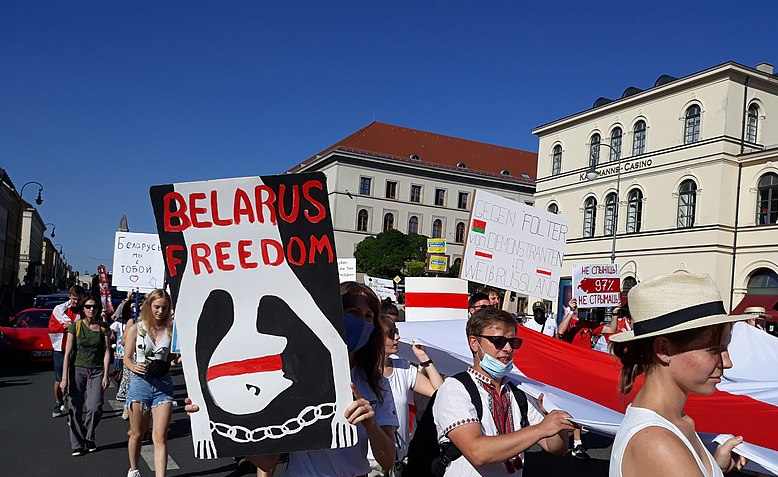 Belarus protests, 13 August 2020. Photo: Manuel Trinidad / Flickr / cropped from original / CC BY-NC-ND 2.0, licence and original photo linked at bottom of article
Belarus protests, 13 August 2020. Photo: Manuel Trinidad / Flickr / cropped from original / CC BY-NC-ND 2.0, licence and original photo linked at bottom of article
Workers need an independent political force in Belarus to win, argues Vladimir Unkovski-Korica
Mass protests have erupted over the last week in Belarus in response to Alexander Lukashenko’s claim that he won a sixth term with 80 percent of the vote.
The scale of the victory Lukashenko has claimed looked manifestly false as pre-election rallies by the opposition saw unprecedented numbers and geographic spread in the country.
Lukashenko’s rule has lasted since 1994, and he has maintained it using authoritarian means and a generous social welfare system.
Unlike its neighbour, Russia, Belarus never placed its Soviet-era, state-owned companies for sale. This allowed it comparative social stability for a long time.
But the economy has not grown since 2010 and there have, in recent years, been moves to erode welfare rights. The government even passed a tax on unemployed people in 2017.
Pro-Western opposition
The long-term, pro-western opposition in the country seemed to be getting nowhere. In an increasingly typical development where political institutions are shown to be rotten to the core, a new opposition arose around local celebrities.
In the Belorussian case, this included a blogger, an ex-banker and ex-diplomat and head of an IT park. When these candidates were disqualified from standing, their partners stood in for them.
Sviatlana Tsikhanouskaya, whose husband was arrested, ran against Lukashenko in the presidential election. According to official results, she fell short of 10 percent, but this appears to have been a brazen lie by the regime.
Tsikhanouskaya herself fled to neighbouring NATO member Lithuania. The West is overtly backing Tsikhanouskaya, while Russia and China have already recognised Lukashenko as the winner of the election.
Protests could go beyond opposition
Protests rocked Belarus shortly after the election, and the regime responded violently. More than 6,700 people have so far been arrested. The internet was suspended for several days and it has been difficult to get reliable news.
It is difficult to say how deeply the country is divided. There is a real danger that the protests could polarise along geopolitical lines, much as they did in Ukraine since the Orange Revolution in late 2004. Tsikhanouskaya certainly promised to end the union treaty with Russia.
Equally, it is possible that demonstrators are moved more by hostility to Lukashenko than loyalty to the opposition, much of which would gladly turn to the West and implement vicious neoliberal reforms that would most certainly not benefit those demonstrating on the streets.
It is in this context that workers of state-run factories and companies are going on strike calling for free and fair elections. Strikes have broken out in some of the biggest workplaces like the BelAZ truck plant in Zhodino, the Minsk Tractor Works, and the Minsk Automobile Plant.
Videos on social media apparently showed workers openly criticising their bosses and demanding to know the true state of affairs in the country.
When workers go on strike, they can realise their power. Given the weak organisational state of the official political opposition, it is not impossible that workers begin to organise independently of the opposition in their workplaces.
Democratic and socialist revolution
From the Serbian 5th October Revolution against Slobodan Milošević in 2000 to the Egyptian Revolution in January-February 2011 leading to the downfall of Hosni Mubarak, workers often turned on their bosses, their workplace Milošević and Mubarak figures.
In Serbia, they even ran their workplaces until after a new set of elections swept away Milošević’s party from power. Yet they did not develop durable institutions of their own. No workplace councils survived and no working class party emerged from the revolutionary turmoil.
As a result, workers won political freedoms but have ever since suffered from the results of privatisation and neoliberal reforms. Elsewhere, as in Egypt, they very quickly saw the return of the old regime to power. In Ukraine, there has been an effective state of war internally and with Russia since the Maidan events in 2014.
The lesson has to be that workers have to be resolute to win democratic reforms, but they have to be doubly resolute to go beyond the phase of democratic revolution in the political sphere to begin to take control of their workplaces and organise a political party of their own that can contest for state power.
The left in Belarus is weak, and the rivalry between the Western powers and Russia means that workers in Belarus will have little time to learn and little space for manoeuvre. But the situation remains unpredictable and the world is an increasingly unstable place. Who knows where and how far revolution can spread once it begins.
Join Revolution! May Day weekender in London
The world is changing fast. From tariffs and trade wars to the continuing genocide in Gaza to Starmer’s austerity 2.0.
Revolution! on Saturday 3 – Sunday 4 May brings together leading activists and authors to discuss the key questions of the moment and chart a strategy for the left.

